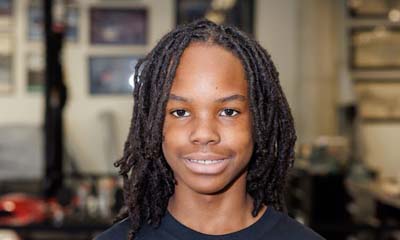Sickle cell disease, hemoglobin SS
Adrienne and Howard Pickett expected their son, Ryan, to be tested for sickle cell disease (SCD) when he was born—it’s one of many conditions for which Alabama newborns are screened—but they did not anticipate a positive diagnosis, especially not for hemoglobin SS (Hb SS), which is typically the most severe form of SCD.
“I remember clear as day when we were told the results of Ryan’s screening,” Adrienne said. “His pediatrician called me and asked for us to come back in and take the test again, which confirmed that he had sickle cell.”
Hb SS results when a child inherits the hemoglobin S gene from both parents. This means the child cannot make any normal hemoglobin. Adrienne had a family history of SCD, but the family did not know that Howard had one as well, so it was a surprise to find out they were both carriers. People with SCD have abnormal, sickle-shaped red blood cells that can stick to blood vessel walls. This causes blockage and prevents the cells from carrying oxygen through the body, causing a pain crisis and other complications.
From infancy, Ryan was seen by doctors at Children’s of Alabama. When he was 3 months old, his parents began attending SCD education classes for new parents at the Children’s Hematology Clinic. “They teach you what to look for and how to take care of your baby when they have a (pain) crisis,” Adrienne explained.
Ryan’s first pain crisis happened when he was 1 year old. His parents thought it was a cold and noticed he had some labored breathing, so they took him to be seen at Children’s. They learned he was in a pain crisis and gave him medication to help manage it.
Having lived with SCD his entire life, Ryan, now 13, understands his disease and how to recognize when a pain crisis is about to occur. “He has learned to differentiate between something like a normal headache and sickle cell pain, even to the point of whether he is not going to be able to manage the pain and have to go to the hospital,” Adrienne said.
Today, Ryan loves to play flag football, basketball and his Xbox when he is not in school or studying. Over the years, he has had about seven hospital admissions. Some were related to a pain crisis, while others included the flu and the removal of his gallbladder. “When a child (with sickle cell) gets a high temperature, you have to go to the hospital to make sure they don't have an infection in the blood,” Adrienne said. “One of our stays was over Easter, and that was pretty bad. Not only could he not stand up on his leg because of the pain, we were there the entire week. I mean, no Easter eggs or anything.”
Adrienne says her family’s experiences at Children’s have been very good. “Everyone—the nurses, the doctors and staff are always so kind and knowledgeable,” she said. “They are always there when we need them and are very understanding.”
From a very young age, Ryan has taken the medication Hydroxyurea to help decrease pain crises and other complications of SCD. Most recently, he and his parents agreed for him to take part in a research study at the Children’s Hematology Clinic. The study includes taking the medication Crizanlizumab, which currently is approved for patients 16 and older. This medication is received though an IV, and Ryan is carefully evaluated while receiving the medication.
His family has been actively involved with the Sickle Cell Foundation of Central Alabama since Ryan was an infant, and they participate in its annual walkathon. Adrienne has even taken her involvement a step further. She recently was asked by the director of the foundation to serve as a team leader for a new parent support group. In the same way Children’s has helped her family, Adrienne is helping other parents who may need guidance. She explains, “We try to get together with other parents to bring awareness for sickle cell to ensure that they are equipped with what they need. Our goal is trying to help them help their kids learn to thrive in today’s world.”











